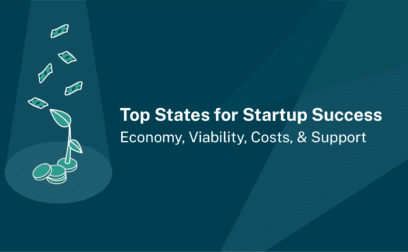TABLE OF CONTENTS
Starting a small business in Alabama may include looking for funds through small business loans. There are lots of options for Alabama small businesses looking for small business loans or other business financing.
Navigating the loan process in Alabama can be daunting. Read on for the best tips to help you get your business the funds it needs.
In Alabama, small businesses can tap into various loan options to meet their financial needs. It’s important to take a good look at your business’s qualifications and determine how much loan you can afford – meaning, how much money you could really borrow and pay back. It’s a good idea to consult with a financial advisor in Alabama if you’re looking to get a small business loan to make sure you understand what you’re signing up for. Most lenders also provide a loan calculation tool so you can see just how much you’ll pay in interest and how much your monthly repayment will be.
Banks and credit unions offer traditional term loans for businesses in Alabama. With a term loan, the lender gives the borrower a lump sum payment, which the borrower repays over a set period of time (the term) with a set amount of interest (the rate). There are different types of loans available for different types of businesses, such as equipment loans or real estate loans. Many major U.S. banks have small business loans available as well as services to help small businesses figure out what type of loan they need. However, traditional term loans may also have more requirements than other types of funding, such as higher credit scores or a set number of years in business.
The U.S. Small Business Administration (SBA) offers a number of programs to small businesses that need funding, including small business loans for real estate, equipment, working capital and even microloans for smaller amounts of money. While the loans are managed by approved lenders like banks or credit unions, the federal government guarantees the loans through the SBA. This means that if the borrower defaults on the loan, or can’t pay it back, the lender will recoup the loss through the U.S. government, which makes lending much less risky for the lender. Limits for the rates and terms for SBA loans are also set by the SBA, which makes them very attractive for small businesses. It also makes these programs very competitive, which can be difficult for some small businesses that are just starting out or don’t have collateral or good credit scores.
Startups or new businesses may have more success with alternative loans from non-bank lenders, such as online lenders. Many financial services companies provide loans to borrowers who may be a higher risk to the lender, such as those with lower credit scores or less time in business. These loans also tend to have shorter approval processes and quicker funding times, which can be attractive to businesses that need funding quickly. However, they also tend to come with higher interest rates and shorter repayment terms to make up for the risk.
Small business grants are one way to find funding for your business without having to worry about paying it back. Many grants are available for small businesses that have mission-based projects or for small business owners who may have difficulty getting funding in other ways.
It may take a bit of research to find a grant that meets your business needs and qualifications. Start with government programs at the federal, state and local levels. Local economic development agencies and chambers of commerce are a great resource to find information on grants tailored to Alabama or even your town or county.
Non-governmental sources like private foundations and corporate organizations also offer business grants available. Leverage online databases, grant directories and your professional network with business associations to uncover potential opportunities.
It’s important to tailor your grant proposal to fit the specific objectives of each opportunity. You should carefully consider the eligibility requirements and criteria before applying so you have the best chance of getting the grant. Some grants may ask you to provide a comprehensive business plan or demonstrate how you’re going to use the funds to benefit the community. This may be through economic growth, increasing employment opportunities or building something specifically for the community to use.
Keep in mind that competition for grants can be fierce, so presenting a compelling case for why your business deserves the grant is crucial. Make sure you stay informed about deadlines, submit a well-prepared application and keep communication open with the grant providers during the process.
When looking for a business grant in Alabama, it’s a good idea to seek advice from business advisors, small business development centers or local chambers of commerce. These organizations can provide insights into what grants are available, how the application process works and how you can maximize your chances of success.
Follow these steps to apply for a business loan in Alabama:
Many factors determine what credit score you’ll need to successfully get a business loan in Alabama. If you’re applying for a traditional term loan or an SBA loan, you’ll have a better chance of success with a higher credit score, usually at least 680 or above. Higher credit scores can lead to more favorable loan terms, including larger loan amounts and lower interest rates. Some SBA loans and alternative lenders will accept lower scores, even in the range of 500-600, but again, they may have higher interest rates or faster repayment terms.
While credit scores are the number one way a lender will determine your creditworthiness (or ability to pay back a loan), there are other factors that they’ll consider. These include your financial profile, such as your business’s financial health, cash flow and revenue. The way you intend to use the loan will also inform how a lender evaluates you. Some lenders may also factor in a personal guarantee or collateral in their decision.
If you have a lower credit score, it’s a good idea to work on improving it before applying for a loan.
Typical interest rates for a business loan in Alabama will depend on what type of loan you apply for, the lender, your qualifications and the market conditions when you apply. For instance, interest rates may be higher across the board during a recession than at other times.
For traditional term loans from banks or credit unions, businesses with higher credit (680 and up) can expect lower interest rates, usually falling between 4-10%. Most traditional term loans will fall at about 6% interest.
SBA loans have competitive rates that are set by the SBA and may be fixed or variable, depending on the type of loan. These rates are usually tied to the U.S. prime rate plus an additional percentage. For example, for an SBA 7(a) loan in 2023 the maximum interest rate is 15% for a loan of $50,000 or less, while a loan of $350,000 or more can only go as high as 11.5%, based on the U.S. prime rate of 8.5%. For an SBA 504/CDC loan, the rate is tied to the U.S. treasury bond rate.
Alternative lenders and online platforms can have a wider variation in their interest rates. These rates can go as high as 60%, so it’s important to know what you’re signing up for.
Depending on what type of loan you apply for, it can take anywhere from 48 hours to several months to get your funds. Traditional lenders tend to have more extensive and detailed application processes, which include application review, underwriting and approval. This can take anywhere from a few weeks to several months. SBA loans can take anywhere from 30 days to six months depending on the loan type.
Alternative lenders, on the other hand, often have simple applications and quicker approval times. Because they tend to have fewer requirements and less complicated approval processes, you can get funds from an online loan in as few as 24 hours after approval in some cases. However, you may be required to pay the loan back much more quickly and with a much higher interest rate than a traditional term loan or SBA loan.
Not every small business can qualify for a small business loan in Alabama, but there are a number of other financing options available.
Securing the best funding for a small business in Alabama requires a systematic approach. Begin by assessing your business’s financial needs and clearly defining the purpose of the funding.
Explore different funding options, including traditional banks, credit unions, online lenders, and government-backed programs like those provided by the Small Business Administration (SBA). Each source presents its unique advantages, terms, and eligibility criteria.
Consider seeking advice from local business organizations, chambers of commerce, or small business development centers in Alabama. These organizations often possess insights into available funding opportunities and can offer guidance on navigating the application process.
Networking is also beneficial. Connect with other local business owners who have experience securing funding in Alabama. Their insights and recommendations can assist you in identifying reputable lenders and gaining a better understanding of the local business financing landscape.
Prior to committing to any funding option, review the terms and conditions, including interest rates, repayment terms, and associated fees. Compare offers from different lenders to make sure you secure the most favorable terms tailored to your specific business needs.
Download the Swoop app today to get started on your search for small business funding in Alabama. Just answer a few questions about your business and what you need the loan for and we’ll find loans you’re most likely to qualify for. Get started today.
Daire made it happen! There is no doubt that Swoop sped up the process and found lenders that worked to our time scale rather than the other way round
Hocque Figureoa
Joint owner, F45 Virginia
Swoop was actually very helpful in helping us get our initial fundraising in place. Swoop was able to connect us with investors, with grant financing options and debt financing options.
Viler Lika
Founder, SingleKey
Pedja was amazing. Super supportive, understanding of our needs and wasn't pushy at all. We've been going back and forth with Swoop for over a year inquiring about different financing options and they were patient until we were ready!
Chris Skeates
F45 Multi-studio owner
Join the 95,000+ businesses just like yours getting the Swoop newsletter.
Free. No spam. Opt out whenever you like.
Kingfisher Way, Silverlink Business Park, Newcastle upon Tyne, NE28 9NX, UK
View in Google Maps35 Bull Street, Lewis Building, Birmingham B4 6AF, UK
View in Google MapsAberystwyth Innovation and Enterprise Campus
Gogerddan Campus
Aberystwyth University
Ceredigion
SY23 3EE
Dogpatch Labs, The CHQ Building, Custom House Quay, Dublin, Ireland
View in Google MapsSuite 801, Level 8, 84 Pitt Street, Sydney, NSW 2000, Australia
View in Google Maps43 W 23rd St, New York, NY 10010, United States
View in Google Maps21 Dreyer Street, Cape Town, South Africa, 7708
View in Google MapsClever finance tips and the latest news
Delivered to your inbox monthly
Join the 95,000+ businesses just like yours getting the Swoop newsletter. Free. No spam. Opt out whenever you like.




